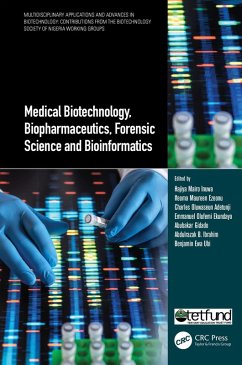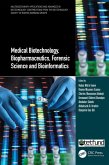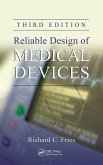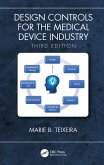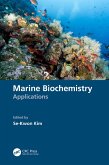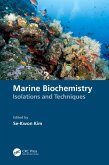Medical Biotechnology, Biopharmaceutics, Forensic Science and Bioinformatics (eBook, PDF)
Redaktion: Inuwa, Hajiya Mairo; Ubi, Benjamin Ewa; Ibrahim, Abdulrazak B.; Gidado, Abubakar; Olufemi Ekundayo, Emmanuel; Oluwaseun Adetunji, Charles; Ezeonu, Ifeoma Maureen
48,95 €
48,95 €
inkl. MwSt.
Sofort per Download lieferbar

24 °P sammeln
48,95 €
Als Download kaufen

48,95 €
inkl. MwSt.
Sofort per Download lieferbar

24 °P sammeln
Jetzt verschenken
Alle Infos zum eBook verschenken
48,95 €
inkl. MwSt.
Sofort per Download lieferbar
Alle Infos zum eBook verschenken

24 °P sammeln
Medical Biotechnology, Biopharmaceutics, Forensic Science and Bioinformatics (eBook, PDF)
Redaktion: Inuwa, Hajiya Mairo; Ubi, Benjamin Ewa; Ibrahim, Abdulrazak B.; Gidado, Abubakar; Olufemi Ekundayo, Emmanuel; Oluwaseun Adetunji, Charles; Ezeonu, Ifeoma Maureen
- Format: PDF
- Merkliste
- Auf die Merkliste
- Bewerten Bewerten
- Teilen
- Produkt teilen
- Produkterinnerung
- Produkterinnerung

Bitte loggen Sie sich zunächst in Ihr Kundenkonto ein oder registrieren Sie sich bei
bücher.de, um das eBook-Abo tolino select nutzen zu können.
Hier können Sie sich einloggen
Hier können Sie sich einloggen
Sie sind bereits eingeloggt. Klicken Sie auf 2. tolino select Abo, um fortzufahren.

Bitte loggen Sie sich zunächst in Ihr Kundenkonto ein oder registrieren Sie sich bei bücher.de, um das eBook-Abo tolino select nutzen zu können.
This book covers a range of topics on exploiting Nigeria's mega biodiversity for food security and health; DNA forensic science and its applications; medical biotechnology and biopharmaceutics; medicinal and underutilized plants; impact and mitigation of antibiotic resistance; bioinformatics applications, medical insect biotechnology, etc.
- Geräte: PC
- ohne Kopierschutz
- eBook Hilfe
- Größe: 11.39MB
Andere Kunden interessierten sich auch für
![Medical Biotechnology, Biopharmaceutics, Forensic Science and Bioinformatics (eBook, ePUB) Medical Biotechnology, Biopharmaceutics, Forensic Science and Bioinformatics (eBook, ePUB)]() Medical Biotechnology, Biopharmaceutics, Forensic Science and Bioinformatics (eBook, ePUB)48,95 €
Medical Biotechnology, Biopharmaceutics, Forensic Science and Bioinformatics (eBook, ePUB)48,95 €![Cell Culture Bioprocess Engineering, Second Edition (eBook, PDF) Cell Culture Bioprocess Engineering, Second Edition (eBook, PDF)]() Wei-Shou HuCell Culture Bioprocess Engineering, Second Edition (eBook, PDF)119,95 €
Wei-Shou HuCell Culture Bioprocess Engineering, Second Edition (eBook, PDF)119,95 €![Reliable Design of Medical Devices (eBook, PDF) Reliable Design of Medical Devices (eBook, PDF)]() Richard C. FriesReliable Design of Medical Devices (eBook, PDF)100,95 €
Richard C. FriesReliable Design of Medical Devices (eBook, PDF)100,95 €![Design Controls for the Medical Device Industry, Third Edition (eBook, PDF) Design Controls for the Medical Device Industry, Third Edition (eBook, PDF)]() Marie B. TeixeiraDesign Controls for the Medical Device Industry, Third Edition (eBook, PDF)171,95 €
Marie B. TeixeiraDesign Controls for the Medical Device Industry, Third Edition (eBook, PDF)171,95 €![Marine Biochemistry (eBook, PDF) Marine Biochemistry (eBook, PDF)]() Marine Biochemistry (eBook, PDF)48,95 €
Marine Biochemistry (eBook, PDF)48,95 €![Biosimilars and Interchangeable Biologics (eBook, PDF) Biosimilars and Interchangeable Biologics (eBook, PDF)]() Sarfaraz K. NiaziBiosimilars and Interchangeable Biologics (eBook, PDF)52,95 €
Sarfaraz K. NiaziBiosimilars and Interchangeable Biologics (eBook, PDF)52,95 €![Marine Biochemistry (eBook, PDF) Marine Biochemistry (eBook, PDF)]() Marine Biochemistry (eBook, PDF)48,95 €
Marine Biochemistry (eBook, PDF)48,95 €-
-
-
This book covers a range of topics on exploiting Nigeria's mega biodiversity for food security and health; DNA forensic science and its applications; medical biotechnology and biopharmaceutics; medicinal and underutilized plants; impact and mitigation of antibiotic resistance; bioinformatics applications, medical insect biotechnology, etc.
Dieser Download kann aus rechtlichen Gründen nur mit Rechnungsadresse in A, B, BG, CY, CZ, D, DK, EW, E, FIN, F, GR, HR, H, IRL, I, LT, L, LR, M, NL, PL, P, R, S, SLO, SK ausgeliefert werden.
Produktdetails
- Produktdetails
- Verlag: Taylor & Francis eBooks
- Seitenzahl: 460
- Erscheinungstermin: 10. Mai 2022
- Englisch
- ISBN-13: 9781000550931
- Artikelnr.: 63643069
- Verlag: Taylor & Francis eBooks
- Seitenzahl: 460
- Erscheinungstermin: 10. Mai 2022
- Englisch
- ISBN-13: 9781000550931
- Artikelnr.: 63643069
- Herstellerkennzeichnung Die Herstellerinformationen sind derzeit nicht verfügbar.
Hajia Mairo Inuwa, Ph.D. is Professor in the Dept. of Biochemistry & Formerly Director, Centre for Biotechnology Research and Training (CBR&T), Ahmadu Bello University, Zaria, Nigeria. Ifeoma Maureen Ezeonu, Ph.D. is a Professor of Medical Microbiology and Molecular Genetics in the Department of Microbiology, University of Nigeria, Nsukka. Charles Oluwaseun Adetunji, Ph.D. is Associate Professor of Microbiology and Biotechnology, & Director of intellectual Property and Technology Transfer, Edo State University Uzairue, Nigeria Abubakar Gidado, Ph.D. is a Professor of Biochemistry and Director North-East Zonal Biotechnology Centre of Excellence at University of Maiduguri. Emmanuel Olufemi Ekundayo, Ph.D. is an Associate Professor of Medical Microbiology and Microbial Genetics, Michael Okpara University of Agriculture, Umudike, Nigeria. Abdulrazak Ibrahim, Ph.D. is a Capacity Development Expert at the Forum for Agricultural Research in Africa (FARA), and Associate Professor of Biochemistry, Ahmadu Bello University, Zaria, Nigeria. Benjamin Ewa Ubi, Ph.D. is Professor of Plant Breeding and Biotechnology & Director, Biotechnology Research and Development Centre, Ebonyi State University Abakaliki, Nigeria.
Part 1: Working Group 04: Molecular Diagnostics and DNA Forensics, 1. Principles and Techniques for Deoxyribonucleic Acid (DNA) Manipulation, 2. Forensic DNA profiling and molecular identification of infectious pathogens: The Nigeria experience, 3. DNA markers in forensic and diagnostic science, 4. Legal standards setting in the use of Forensics DNA Barcode: Evidence for wildlife crime detection and prosecution in Nigeria. Part 2: Working Group 07: Medical and Pharmaceutical Biotechnology, 5. Harnessing Indigenous Bioresources for Development of Diagnostics for Detection and Confirmation of Infectious agents in Nigeria, 6. Antibiotic Resistance: Global Trends, Impact And Mitigation, 7. Safeguarding Nigeria Territory from the use of antibiotic resistant microbes in bioterrorism, 8. Deep Learning and Economic Prospects in Medical and Pharmaceutical Biotechnology, 9. Health and Nutritional benefits of numerous bioactive components derived from fish and fish products, 10. Repositioning antiviral drugs as a rapid and cost-effective approach to discover treatment against SARS-CoV-2 infection, 11. Corn Silk and Health Benefits, 12. Bioengineering of Pharmacologically-Active Metabolites for Effective Drug Nano Formulations from the Callus of Medicinal Plants and their Significant Application in Nanomedicine: Recent Advances, Part 3: Omics and Bioinformatics, 13. Bioinformatics: a tool for biotechnological advancement, 14. Role of Nucleotide Sequence Analysis in Human Genetics and Genomics, 15. Application of Computational and bioinformatics techniques in drug repurposing for effective development of potential drug candidate for the management of COVID-19, 16. Computational Intelligence Techniques for Combating COVID 19, 17. Machine learning and behavior modification for COVID 19, Part 4: Working Group 12: Medicinal and Underutilized Plants, 18. Underutilized plant species, a huge potential for economic development in Nigeria, 19. The place of neglected legumes in human nutrition and food security, 20. Antiprotozoal Activity of medicinal plants against Entamoebahistolytica, the causative agent of amoebiasis, 21. Harnessing benefits of underutilized Plant Species for Economic Growth in Nigeria, Part 5: Working Group 13: Medical Insect Biotechnology, Genomics and Molecular Genetics of pests, 22. Exploiting Arthropod midgut components for development of interventions against infectious diseases, 23. Genome-based Vector Surveillance for Effective Prediction and Control of Mosquito-Borne Viral Disease Outbreaks in Nigeria
Part 1: Working Group 04: Molecular Diagnostics and DNA Forensics, 1. Principles and Techniques for Deoxyribonucleic Acid (DNA) Manipulation, 2. Forensic DNA profiling and molecular identification of infectious pathogens: The Nigeria experience, 3. DNA markers in forensic and diagnostic science, 4. Legal standards setting in the use of Forensics DNA Barcode: Evidence for wildlife crime detection and prosecution in Nigeria. Part 2: Working Group 07: Medical and Pharmaceutical Biotechnology, 5. Harnessing Indigenous Bioresources for Development of Diagnostics for Detection and Confirmation of Infectious agents in Nigeria, 6. Antibiotic Resistance: Global Trends, Impact And Mitigation, 7. Safeguarding Nigeria Territory from the use of antibiotic resistant microbes in bioterrorism, 8. Deep Learning and Economic Prospects in Medical and Pharmaceutical Biotechnology, 9. Health and Nutritional benefits of numerous bioactive components derived from fish and fish products, 10. Repositioning antiviral drugs as a rapid and cost-effective approach to discover treatment against SARS-CoV-2 infection, 11. Corn Silk and Health Benefits, 12. Bioengineering of Pharmacologically-Active Metabolites for Effective Drug Nano Formulations from the Callus of Medicinal Plants and their Significant Application in Nanomedicine: Recent Advances, Part 3: Omics and Bioinformatics, 13. Bioinformatics: a tool for biotechnological advancement, 14. Role of Nucleotide Sequence Analysis in Human Genetics and Genomics, 15. Application of Computational and bioinformatics techniques in drug repurposing for effective development of potential drug candidate for the management of COVID-19, 16. Computational Intelligence Techniques for Combating COVID 19, 17. Machine learning and behavior modification for COVID 19, Part 4: Working Group 12: Medicinal and Underutilized Plants, 18. Underutilized plant species, a huge potential for economic development in Nigeria, 19. The place of neglected legumes in human nutrition and food security, 20. Antiprotozoal Activity of medicinal plants against Entamoebahistolytica, the causative agent of amoebiasis, 21. Harnessing benefits of underutilized Plant Species for Economic Growth in Nigeria, Part 5: Working Group 13: Medical Insect Biotechnology, Genomics and Molecular Genetics of pests, 22. Exploiting Arthropod midgut components for development of interventions against infectious diseases, 23. Genome-based Vector Surveillance for Effective Prediction and Control of Mosquito-Borne Viral Disease Outbreaks in Nigeria
